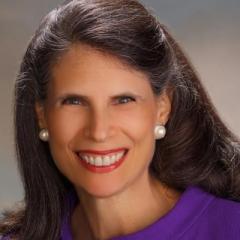
Outstanding ACC Volunteer: Cantor Sarah Sager
Cantor Sarah Sager has been recognized by the ACC for her many years of involvement and was the recipient of its President's Award for Volunteerism in 2015. She has served Anshe Chesed Fairmont Temple in Beachwood, OH since 1980.
In what capacity have you volunteered for the ACC?
I love the ACC and have enjoyed every minute of volunteering!
My involvement goes back to 1978, right after investiture when I was asked as a new graduate to serve on the board. I served on the board for many years and had many jobs. I was Secretary and then became Vice President. My service on the ACC board was not continuous. Most recently, I served until 2015, during which time I was, among other responsibilities, the chair of the Personnel Committee. In the early 80’s, I was asked to be the first ACC co-chair of the Commission on Synagogue Music. Today, it is a pleasure to still serve on the Commission, now known as WMRL (The Commission on Worship, Music and Religious Living).
Over the years I also had the privilege of serving on many advisory committees from the Clergy Manual Committee to the Advisory Committee for the Original Study for Mishkan T’filah.
Wearing many volunteer hats for the ACC has helped me tremendously in my work. It has always made me feel that I was keeping current with what was going on in the Cantorate, the Reform Jewish world and the Jewish world in general. It also made me feel that I was representing the cantorate as a profession in my congregation.
Currently, I serve as the Cantorial representative to the Board of Governors of the Hebrew Union College – Jewish Institute of Religion, an appointment made by Rabbi David Ellenson, then President of HUC. We meet four times a year. Whereas this is not considered an ACC position, I do feel that I am representing all of my colleagues.
What’s the best part about being a Cantor?
[It’s all about building] relationships and being present, supportive and helpful at important times in people’s lives. It’s about bringing a sense of God’s presence and the power of Jewish tradition into those moments – and the continuity and beauty of Judaism.
What is the most serious problem facing the cantorate presently and in the future?
I would say it’s the ever changing nature of Jewish life. We don’t know what synagogues will look like in the near future. We live in a non-denominational time, a time of “do it yourself;” a time of the internet which makes everything more accessible such as renting a tutor, on-line Torah chanting and much more. It is difficult to predict where the cantor will fit in. Many congregations don’t feel the need to have a cantor as long as someone is doing music that fills their perceived needs.
What influenced and/or motivated you to become a Cantor?
It actually was an accident. I was living in New York and pursuing a legitimate singing career when I heard that there were women in the cantorate. I thought about it right there and then and biked over to HUC (which was then in my neighborhood on 68th Street) and expressed interest. Three days later, I was sitting in a class as a newly enrolled cantorial student at HUC. I never looked back. A few months later, I was serving a congregation, my student pulpit in Connecticut. I went in because I wanted to sing, and discovered a whole world. I found that the cantorate combined two loves of mine: music and Judaism, and I was hooked.
What is one thing you’d like to tell us about yourself, that we might not know about you?
I love my kids. I love to walk. And that I was a finalist in the Miss Chicago contest when I was 18 years old!

